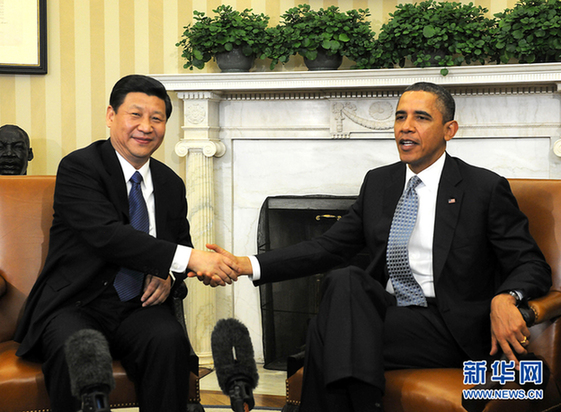Xi's US visit successfully boosts cooperative partnership
 0 Comment(s)
0 Comment(s) Print
Print E-mail Xinhua, February 20, 2012
E-mail Xinhua, February 20, 2012
Chinese Vice President Xi Jinping's five-day visit to the United States has successfully pushed forward bilateral ties and yielded a variety of fruits, Foreign Minister Yang Jiechi said Friday night.
 |
|
China's Vice-President Xi Jinping(L) meets with US President Barack Obama at the White House in Washington, February 14, 2012. |
The Feb.13-17 visit was aimed at further implementing the important consensus reached by Chinese President Hu Jintao and U.S. President Barack Obama last year, and advancing the China-U.S. cooperative partnership based on mutual respect and mutual benefit, said Yang at the end of the visit.
The visit came at the 40th anniversary of former U.S. President Richard Nixon's ground-breaking trip to China, which opened the door for the normalization of China-U.S. relations years later, said Yang, who was accompanying Xi on the visit.
During the visit, Xi traveled to four cities across the United States: Washington D.C. in the east, Muscatine and Des Moines in the midwest, and Los Angeles in the west.
He attended 27 formal events. He met with Obama, Vice President Joe Biden, Congress leaders and other senior officials. He addressed several business forums, and visited a farm, a school, as well as his old friends who he acquainted in Iowa 27 years ago.
Yang said the Chinese leader had well interacted with the U.S. side in a comprehensive way. His visit has accomplished the goals of deepening understanding, boosting mutual trust, expanding cooperation and promoting friendship, and therefore turns out to be a success, said Yang.
Yang said the visit gained the following achievements.
First, it has promoted the important consensus that China and the United States should further boost their cooperative partnership.
The two sides agreed that the China-U.S. relationship is one of the most important bilateral relations in the world and that the two nations could be cooperative partners not only at present but also in the whole of the 21th century.
The two sides also stressed the importance of enhancing strategic mutual trust through dialogue.
Xi said China is committed to a road of peaceful development and is sincere in its aspirations to develop ties with the United States.
Xi also said that China attaches great importance to bilateral military ties and that China is willing to work with the U.S. side to promote the steady and sound development of bilateral military ties based on the principle of mutual respect, mutual trust, reciprocity and mutual benefit.
Obama and Biden said that the United States welcomes the peaceful development of China and that a strong, prosperous and stable China is in the interests of their country and also conducive to peace and prosperity of the Asia-Pacific region and the whole world.
The United States is willing to work with the Chinese side to strengthen exchanges between high-level military officials and jointly develop strong military ties conducive to overall bilateral relations.
Leaders of the two countries also showed positive attitudes toward the further enhancement of exchanges between the two nations' legislative bodies and political parties.
Both sides agreed that it is of great importance to properly address sensitive issues.
Xi said the questions of Taiwan and Tibet concern China's core interests. He expressed the hope that the U.S. side would properly address China's concerns over the issues and work in line with the three China-U.S.joint communiques so as to avoid damage to bilateral ties.
On human rights, Xi said China is willing to conduct candid and constructive dialogues with the United States and other members of the international community on the principles of equality and mutual respect so as to increase understanding, reduce divergences and make improvements together.
Obama and Biden said the U.S. side attaches great importance to China's stance and views on these issues.
They said the U.S. government sticks to the one-China policy based on the three joint communiques and does not support "Taiwan independence," adding that the United States hopes to see continuous peaceful development of cross-Straight relations.
They also said the United States would like to maintain dialogue with China on human rights and agreed that the two sides should properly handle sensitive issues concerning bilateral ties.
Second, Xi's trip in the United States expanded mutually beneficial practical cooperation in trade and other fields.
During the visit, Xi expounded on the nature of China-U.S. trade ties, saying that they serve as "ballast" and "propeller" of overall bilateral relations.
He used figures and examples to explain how the two economies are complementary to each other and how bilateral trade brings benefits to both sides, making clear the significance of maintaining the steady development of bilateral trade ties.





